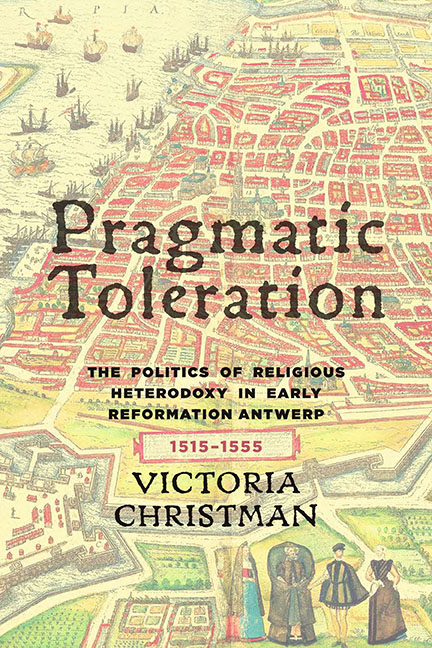Book contents
- Frontmatter
- Dedication
- Epigraph
- Contents
- Acknowledgments
- Introduction
- 1 The Lay of the Land: Government and Law in Brabant
- 2 Undercover: The Claes vander Elst Conventicle
- 3 Pragmatic Intolerance: Antwerp's Anabaptists
- 4 People of the Book: Heterodox Printers and Publishers in Antwerp
- 5 Between Stage and Scaffold: Rederijker Trials in Antwerp
- 6 Trade in Tolerance: The Portuguese New Christians in Antwerp, 1526–50
- Conclusion: Rulers and Religious Renegades
- Appendix 1 Chronology of Antiheresy Legislation in Brabant
- Appendix 2 Answers at Ghent
- Abbreviations
- Notes
- Bibliography
- Index
6 - Trade in Tolerance: The Portuguese New Christians in Antwerp, 1526–50
Published online by Cambridge University Press: 15 March 2018
- Frontmatter
- Dedication
- Epigraph
- Contents
- Acknowledgments
- Introduction
- 1 The Lay of the Land: Government and Law in Brabant
- 2 Undercover: The Claes vander Elst Conventicle
- 3 Pragmatic Intolerance: Antwerp's Anabaptists
- 4 People of the Book: Heterodox Printers and Publishers in Antwerp
- 5 Between Stage and Scaffold: Rederijker Trials in Antwerp
- 6 Trade in Tolerance: The Portuguese New Christians in Antwerp, 1526–50
- Conclusion: Rulers and Religious Renegades
- Appendix 1 Chronology of Antiheresy Legislation in Brabant
- Appendix 2 Answers at Ghent
- Abbreviations
- Notes
- Bibliography
- Index
Summary
The cases so far considered span much of the first half of the sixteenth century. They demonstrate the intensification of Holy Roman Emperor Charles V's religious policies, and the opposition those policies elicited from the municipal officials of Antwerp and, occasionally, elsewhere. In these cases, the rulers of Antwerp exercised various tactics of opposition to Charles in an attempt to maintain the political autonomy and religious independence of their city. In so doing, they evinced several forms of pragmatically tolerant behavior, falling primarily into the categories of selective toleration and toleration as resistance. In this chapter, we shall examine the history of the Portuguese New Christian community of Antwerp and the city governors’ attempts to protect these extremely valuable inhabitants from the encroaching arm of their imperial rulers. As they fought their Habsburg overlords, the Antwerp authorities would come to use all of the weapons of pragmatic toleration already in their arsenal. As each of these methods failed, they were forced to forge new paths into as-yet uncharted territory of religious tolerance. By the time the New Christians left the city in the late 1540s, the Antwerp magistracy had come to articulate a theologically grounded defense of inclusivist religious tolerance. This remained a pragmatic tactic in that, in composing this defense, they were not hoping to achieve universal religious pluralism. Such a notion would have horrified them. Rather, because all else had failed, they found themselves forced to use theological reasoning to defend their ongoing pragmatic practices toward the New Christians. The motivations underlying their arguments did not change, but remained largely economic. As such, their theological defense of religious tolerance could be seen as a disingenuous. Their actions in this case provide clear evidence against the notion that the theological defense of religious toleration necessarily precedes practice. For in this case, the councilors’ defense grew solely out of economic expediency and not from any theoretical or moral desire for religious pluralism.
Antwerp experienced its most spectacular economic growth between 1495 and 1565. In this period, the population of the city exploded from an initial size of around forty thousand inhabitants to a figure of more than one hundred thousand.
- Type
- Chapter
- Information
- Pragmatic TolerationThe Politics of Religious Heterodoxy in Early Reformation Antwerp, 1515–1555, pp. 107 - 130Publisher: Boydell & BrewerPrint publication year: 2015



